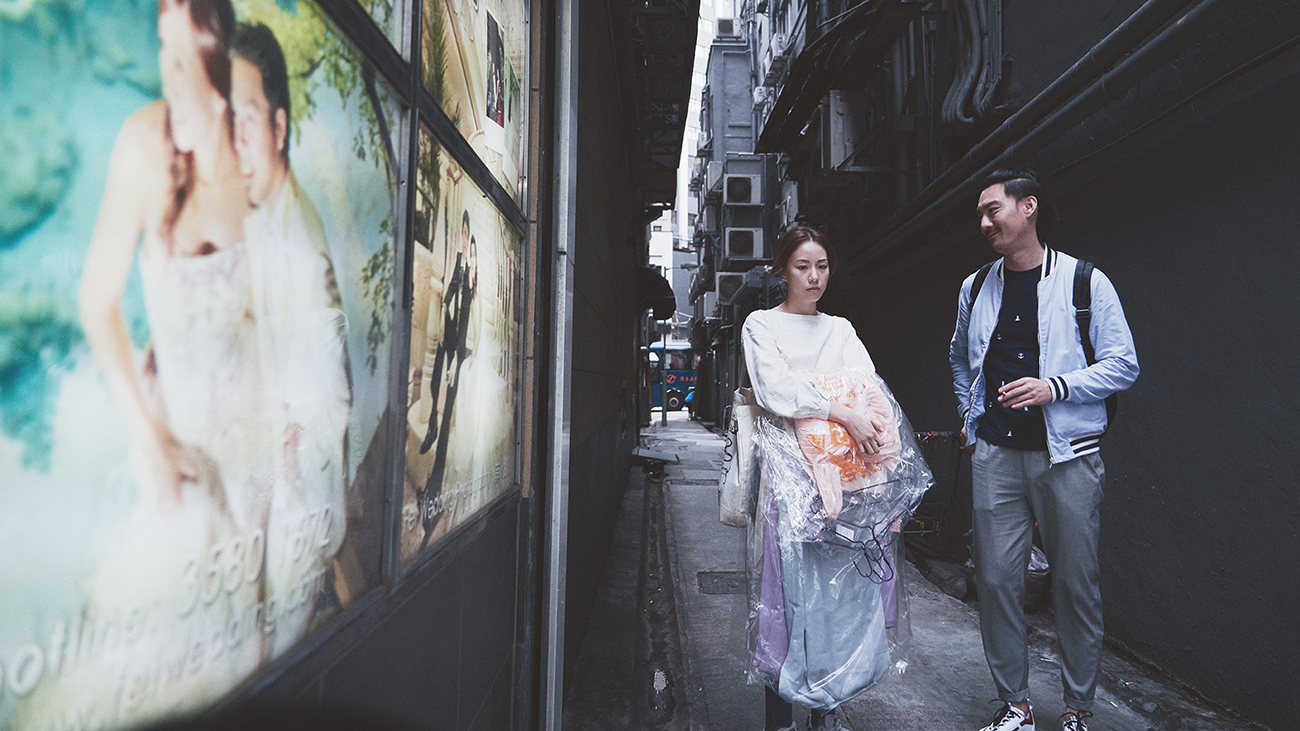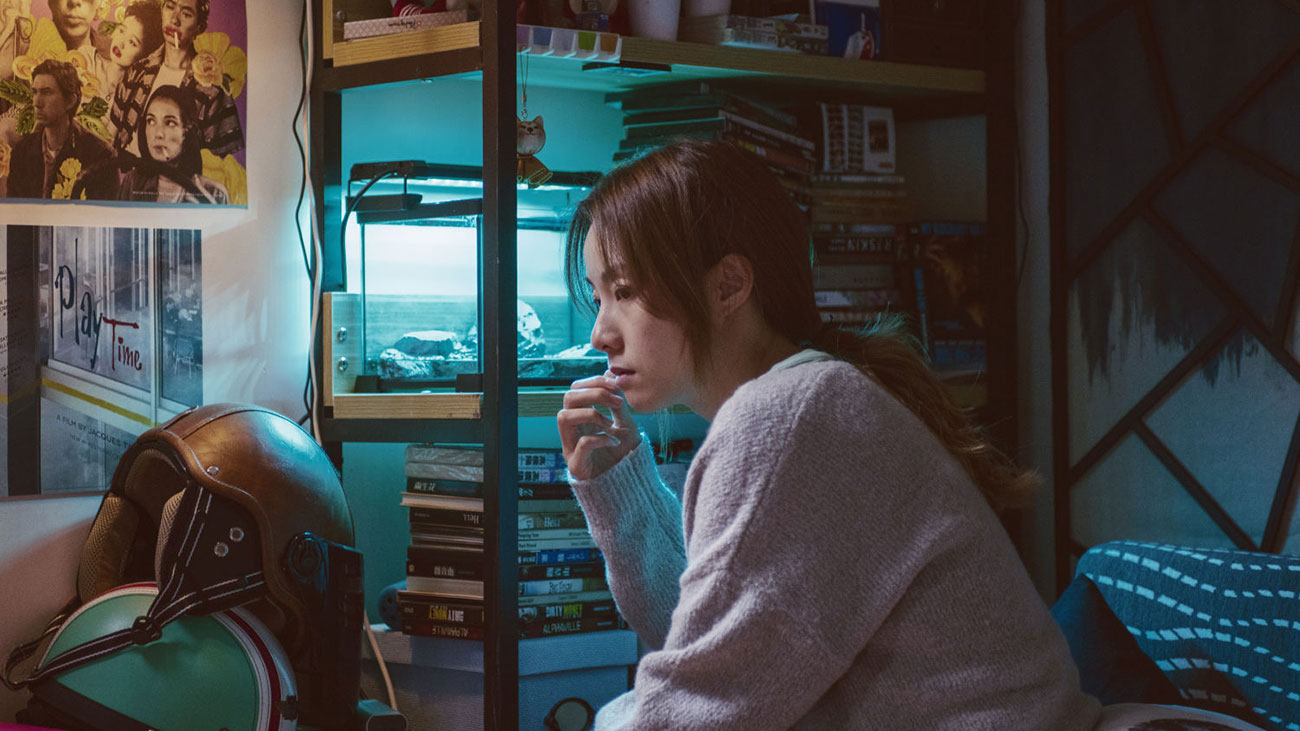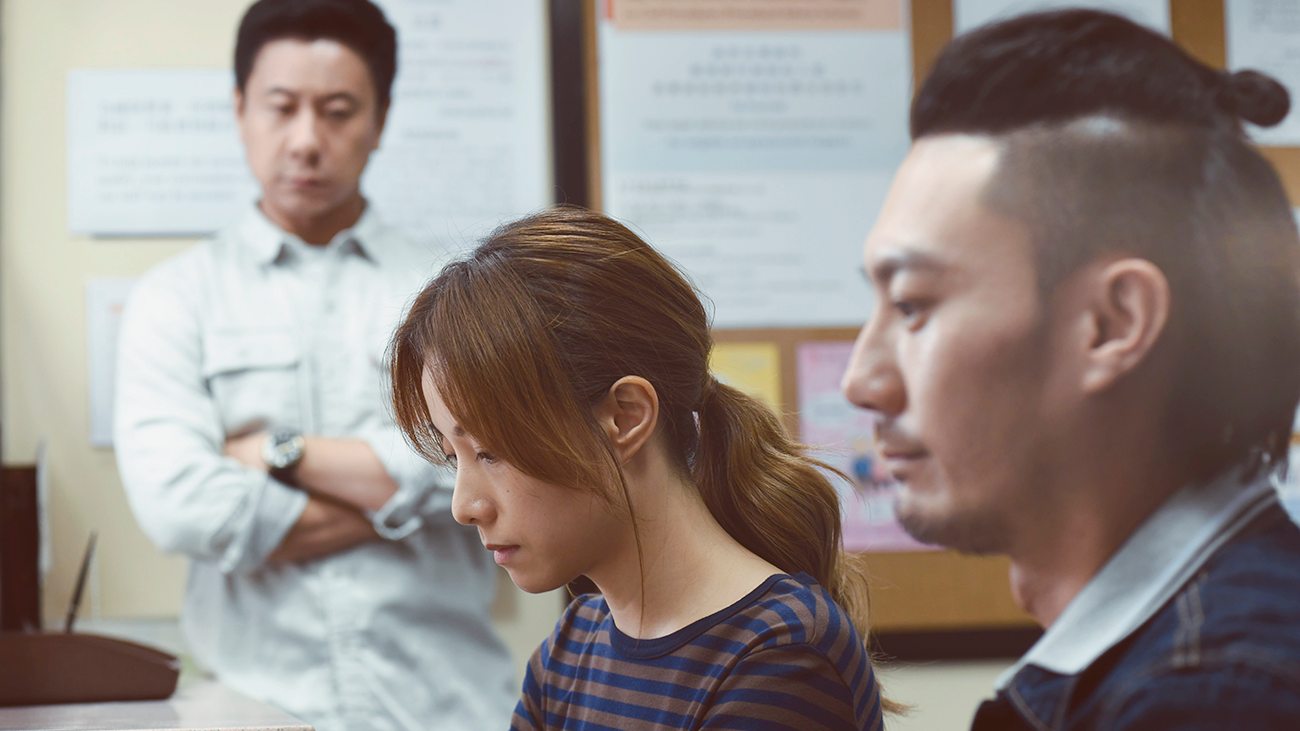Watching My Prince Edward was the most anxiety-inducing film I had seen in recent years, more than any actual horror film. Written and directed by Norris Wong, who was previously an assistant writer on Tracy Choi’s Sisterhood, her debut feature is an incisive film about the business of weddings and the realities of modern relationships; one that could only be told from the point of view of a woman. Wong, who considers herself more of a writer than a director, observes these themes with sharp writing.
The film’s premise sounds playful initially. Fong (Stephy Tang) is 31 years old and works at Golden Plaza, a shopping mall in the Prince Edward district of Kowloon known as Hong Kong’s marriage market due to its abundance of wedding businesses. She works with her boyfriend of seven years Edward Yan (Chu Pak-hong) who handles wedding photography and videography. When he proposes to her one day, it doesn’t come as a surprise to everyone around them. But Fong has a secret. Ten years prior, she entered a sham marriage with a man from Mainland China just so she and a friend could make quick cash to rent a flat together. She thought the ‘agency’ that set up the scheme for her had handled her divorce, but when her legal Chinese husband Yang Shuwei (Jin Kaijie) comes back into the picture in hopes that she help him expedite his Hong Kong residency, it complicates matters for Fong who just wants a quick divorce and to keep this secret from Edward.

嫁鸡随鸡 – Marriage and the loss of self
Norris Wong presents a sardonic look at marriage in My Prince Edward. One of the ways she does this is through Fong’s arc where we see an utter lack of identity behind her character. This is exhibited through the film’s sets, costuming, colour grading, and even the performances—everything is presented in a muted, understated, almost drab manner. In any other film this might be a critique but here, it’s a striking feature of My Prince Edward in that Wong knows exactly the kind of story she wants to tell.
In the opening scene, Fong wears a slouchy grey long sleeved top with a v-neck. Normally a clothing item like this wouldn’t catch anyone’s eye, but it’s this top that leads to a small argument between Fong and Edward; the latter criticises the former for wearing something that reveals her bra strap. Fong’s entire wardrobe is drab and colourless, shapeless even. She even starts wearing high-collared versions of her slouchy grey top after. The one green t-shirt she wears at home is a washed out muddy green. Her clothes very much reflect her sense of self. She has no real interests and no real passion regarding her relationship or her job. Even at the start of the film when she ‘acquires’ a pet tortoise (which becomes a metaphor for her own life), it is not so much of an active choice on her part but one forced on to her as the shopkeeper assumes she wanted it and shoves it into her hands.
For a good chunk of the film, Fong is the definition of 嫁鸡随鸡 (jià jī suí jī, literally: marry a chicken, follow the chicken) and lets Edward take charge of everything, including throwing out a pair of her denim shorts, another clothing item he feels is too revealing. It is nothing short of ironic then when her legal husband from a sham marriage Yang Shuwei expresses disbelief over Fong’s passivity towards Edward’s controlling choices after Yang oversees Fong and Edward’s text message conversation regarding her denim shorts. Indeed, Fong is extremely passive and chooses to avoid confrontation by going along with whatever the people around her want. Even if she is displeased, she wears a sullen expression instead of voicing it out. When Edward proposes to her, she never actually says “yes” and her silence is just assumed as assent on his part. So when we see Edward or Fong’s future mother-in-law bulldozing over what few opinions she does have, it’s not so much that Fong is oppressed, but that she has yet to develop agency over her own self. The realisation that she can no longer maintain the status quo with a major life decision looming, coupled with the sudden arrival of her legal husband, acts as a catalyst for her to actually think about what she really wants.
In the last act of the film, the slouchy grey top appears again. Fong, for the first time is doing something actively, instead of reacting, or keeping passive. She chooses to wear this top and Wong makes it a point to show Fong pulling it out of a paper bag hidden behind the closet. She also travels from Hong Kong to Fuzhou, China, to visit Yang Shuwei without telling Edward and switches off her phone to avoid Edward’s bombardment of text messages. She insists on giving Yang Shuwei’s fiancée a wedding gift (She asserts! She won’t take no for an answer!). She goes online shopping and buys a kitchen table for herself without consulting Edward. It is an ending left open to interpretation. Drab it may be, perhaps it is only fitting the film ends on her wearing the top that marked the start of her finding out who she really is outside of her relationship with Edward.

同床异梦 – Same bed, different dreams
The marketing of the film including the posters and still images push My Prince Edward in the direction of an offbeat relationship dramedy. In fairness, it is a film that is hard to define, with reviews characterising the film as a “sensitive relationship drama” and “restrained” which, I suppose, is a matter of (male) perspective. But Fong still takes precedence in these marketing materials. If anything, My Prince Edward is more of a blackly comic story about Fong, rather than about the relationship. Edward is not given equal weight in this story, and he shouldn’t. The film adaptation of Kim Ji-young, Born 1982 this is not.
The acerbic humour that really sets the film apart starts with its title. The Mandarin language title 金都 (jīn dū) refers to Golden Plaza, the shopping mall where most of the action takes place. The English title however, My Prince Edward, makes it sound like an early 2000s romantic comedy. In actuality, the title takes on multiple meanings when we understand that ‘Prince Edward’ refers to three significant things in the film:
- The area in North Kowloon where Golden Plaza is located
- The name of Fong’s boyfriend Edward, who should be the Prince in her fairy tale wedding narrative
- Prince Edward, for whom the area was named for. He is referenced in the film as a symbol of ultimate romance, having abdicated the throne to marry Wallis Simpson.
These three layers of the title become increasingly ironic as the story progresses. The setting in the Prince Edward area of Kowloon also reflects Hong Kong’s romanticisation of its colonial past, and director Norris Wong’s desire to challenge global perceptions of Hong Kong as a modern, cosmopolitan city. “Many people are under the impression that Hong Kong is very Westernized and that women here enjoy more freedom than they do in other places in Asia,” she said in an interview with Cinema Escapist. “In my experience though, I’ve found Hong Kong to be more conservative in almost every respect.” Yang Shuwei, Fong’s legal Chinese husband, mocks her upcoming nuptials, especially after learning how controlling Edward is. “No one rushes to get married anymore. Are you Hong Kongers so old-fashioned nowadays?”
In an interview years after their marriage, Wallis Simpson said she would like to have been head of an ad agency. Like many women before her and many women still, she compromised an individual career and her dreams for the seemingly more ‘noble’ pursuit of marriage. By being married to a Prince, she also sacrificed her privacy and freedom. Freedom within a marriage is another major discussion within the film. Yang Shuwei, for example, represents the strive for freedom. Even though he is in a relationship, he maintains his individuality and sees the rush to get married as a social construct. However, he too eventually bows to the pressure of getting married before he is ready because of an unexpected pregnancy. His girlfriend seems strangely conservative and out of step with who he is. Why are they together then?
As mentioned previously, the film has a very muted colour palette and style to reflect the sheer mundanity of Fong’s life, and her relationship with Edward. It is therefore jarring when you see elements that disrupt this dreariness, starting with the movie posters hanging up in Fong and Edward’s cramped little apartment. For the most part, the apartment is generic looking, functioning as a living space rather than an expression of the two people who live in it. But then you see there are posters of Rebecca (1940) and Eternal Sunshine of the Spotless Mind (2004). Perhaps Fong is a cinephile at heart, but these production design choices also act as tongue-in-cheek references to the themes of the film: both films are coincidentally about couples who come together without knowing anything about each other and are also about the dangers of projecting an image on the other, and having to grapple with a loss of individual identity outside of being in a couple.
Then there are scenes in Fong and Edward’s bedroom that are drenched in red from the neon lights of Golden Plaza. Norris Wong notes, “That’s the actual color of the Golden Plaza neon lights. The colour red is a colour of celebration in Chinese culture. It’s used for marriage and Chinese New Year. But red is also a scary color because it’s moody, bloody. That conflict matches with the story as well. Is it a celebration or is it scary?” As Fong and Edward lie next to each other, bathed in the red glow of Golden Plaza’s neon, they become the literal manifestation of another Chinese saying regarding marriages—同床异梦 (tóng chuáng yì mèng, literally: same bed, different dreams). These red, night-time scenes often involve dialogue that show how differently Fong and Edward are. So why are they still together? What does it mean to be a couple? What are the reasons for getting married in 21st century Asia?

门当户对 – Marriage as a socio-economic construct
There is yet another saying in Chinese—门当户对 (mén dāng hù duì, literally: the right door fits in the correct house) that is often used in relation to marriages. Broadly taken to mean that compatibility is important in a marriage, the ‘compatibility’ referred to lies in the backgrounds of the couple, and their similarity in social and economic status. The characters in My Prince Edward are ordinary, middle-class citizens, so class standing is besides the point, but it does bring home the idea that marriage is an economic proposition.
From beginning to end, marriage has revolved around the idea of an economic safety net. Yang and Fong’s sham marriage was based out of a need for financial freedom. Yang wanted the Hong Kong residency permit that would give him more freedom and opportunities while Fong wanted a quick cash grab so she could move away from her neglectful family.
One of the few things we do learn about Fong is that she really wants to move out of Golden Plaza and into a new flat, but Edward’s mother wants them to buy their current leaky, old flat above their shop in Golden Plaza so she can cover the first installment. Edward then meets another couple, customers who are about to get married, who reveal the reason they’re getting married is because the fiancé’s parents agreed to buy a new flat for the couple upon marriage. This was especially striking to me as a Singaporean to discover that, much like in Singapore, marriage culture in Hong Kong was often intertwined with real estate1In Singapore, marriage is intrinsically tied with the housing market. Most Singaporeans live in government subsidised flats. Because land space is so limited, you have to apply to ballot to purchase a flat. The type of flats you can ballot for depends on your household income, and you get additional subsidies by the government as an engaged/married couple. Therefore, marriage is often seen as a precursor before applying. If a couple breaks their engagement, and therefore their housing contract with their government, they face losing down payment and additional penalties..
When Yang goes against his initial beliefs to settle down and marry his girlfriend, it is only because she is pregnant and he makes the financial commitment to raise the baby with her—not because of anything else. This is evidenced by an entire scene taking place in a crowded convenience store as he discusses with Fong his change of plans while literally buying baby items in bulk and stuffing them into a suitcase. Considering how he initially accused his girlfriend of getting pregnant on purpose to tie him down and even suggested an abortion, his quip, “you can still have freedom in a marriage,” seems vaguely ominous.
Because Fong is so opaque a character, we never know why she is with Edward when he’s kind of a schlump and controlling of her. And although he is never cruel or abusive, as an audience member you know she doesn’t really love him, or want to spend the rest of her life with him, but she doesn’t really see any other option as a single woman in an expensive city. So she stays with him out of convenience. It isn’t until her tortoise, which was thrust upon her, is thrown out by Edward’s mother without her choice under the guise of “giving it freedom” that she questions her own freedom in a potential marriage. This gives rise to the following conversation, where Fong realises the weight of her non-decisions.
Fong: “Why do you all think that marriage means happily ever after?”
Edward: “It doesn’t mean that. But there’s no happiness if you don’t get married. It’s like getting a contract. It guarantees you a life partner. We’re vowing that we’ll only love each other and give up all other options.”

There are some who may say My Prince Edward presents a completely cynical view of marriage. But that simply isn’t true. Norris Wong’s writing is clear-eyed, assertive and never bitter. In an interview with Zolima CityMag, Wong’s refusal to back down from her producers’ requests to make the men more likeable only makes her writing more authentic, especially since they were based on men she knew. When Little Women (2019) was released, many praised the way Greta Gerwig portrayed many aspects of a woman’s life as being tied to money, and how relevant it was today. Norris Wong also mentions Little Women in the same interview when discussing the way both films end with regards to marriage.
Due to the rise of mass media we now conflate marriage with the very romantic notions of love and commitment and both men and women alike have a long way to go to unlearn these archaic yet historically modern ideas—marriage as romance only really developed in the 18th century. Fundamentally however, marriage has always been about social status and economic prospects. My Prince Edward therefore depicts my personal nightmare as a young Asian woman living in one of the most expensive cities in the world. If I had never unlearned the damaging ideas of coupledom and marriage, would I be yet another Fong? The answer is probably yes. I know, and everyone I know knows at least one woman in every generation who stayed in a relationship out of convenience—the kind of woman who compromised her dreams, erased her identity as a result of domesticity and the ‘noble’ pursuit of family instead of choosing themselves.
In the bland, dull world of Fong’s, Norris Wong created a suffocating environment that depicts Fong’s perceived lack of choices. There is a sense of urgency and anxiety towards the banal circumstances and taking away of choices. It was what I should have felt and seen when watching the sanitised adaptation of the controversial South Korean feminist novel Kim Ji-young, Born 1982 and I certainly got it here. “Giving up all options?” Does that really sound like what anyone wants? That’s the line that haunts me, and haunts Fong as well. The film concludes with an open ending. We are not privy to whether or not Fong does break up with Edward or not. But perhaps that isn’t important, because this isn’t his story. This is about Fong learning about herself, walking the open road, and maybe, for once, learning how to choose herself.
